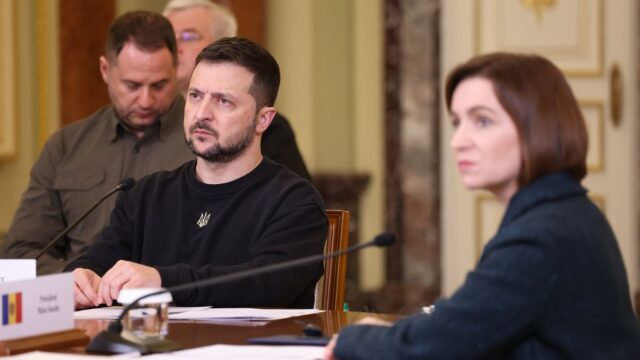The 12 capitals say formal talks on both countries’ EU membership bids should be convened “by the end of June.”
Ministers from 12 EU countries have called for the next steps to be taken in the candidatures of EU accession of Ukraine and Moldova before the end of June, when the Hungarian Government of Viktor Orbán must assume the rotating six-month presidency of the Council of the EU.
In a letter addressed to the Belgian Minister of Foreign Affairs, Hadja Lahbibwhose Government currently chairs the Council, ministers affirm that rapid progress in both the kyiv and Chisinau accession processes “would boost morale and drive reform efforts in these countries”.
The letter, of which Euractiv first reported, was headed by Czech Republic, according to diplomatic sources. It was also signed by the foreign or European ministers of Sweden, Estonia, Finland, Portugal, Latvia, Poland, Lithuania, Germany, Slovenia, Romania and Slovakia.
Although he has not officially signed the letter, France He has also committed to “doing everything possible” to “hold the first intergovernmental conference before the end of the month”, according to an Elysée source.
The 12 capitals want the Member States to adopt the negotiation frameworks -the roadmap for accession talks – and kick off negotiations by calling the first intergovernmental conferences with both countries before the end of this month.
Both steps require the unanimous blessing of all 27 EU member states, but according to diplomats, Hungary currently blocks both decisions.
The opening of accession negotiations with Ukraine and Moldova was approved in principle by the 27 EU countries in December, with the Hungary’s abstention.
But the Hungarian Prime Minister, Viktor Orbán, has consistently opposed Ukraine’s rapid accessionciting concern about the levels of corruption in the country and the lack of measures to protect the rights of the Hungarian minority in the border region of Transcarpathian.
A slow process that requires consensus
Countries waiting to join the bloc must carry out a series of reforms, including judicial, constitutional and economic reforms, before they are considered ready for accession. The process is notoriously long and, on average, has lasted around one of each for aspiring countries.
Starting negotiations is just one in a long series of steps, all of which require the unanimous support of the current members of the EU.
Given the Orbán will assume the presidency of the EU Council from July – which will give him the power to set the agenda and chair ministerial meetings – ministers fear the talks could be further derailed unless Hungary gives in before the end of June.
The exasperation with Orbán’s government grows as he continues to veto key decisions on military aid to kyiv.
It’s time to move forward
The 12 ministers insist that, given the “results achieved and the reform efforts underway in both Ukraine and Moldova”, “the time has come to move forward”.
“To continue a credible enlargement process, the EU must provide tangible benefits to the populations of the respective countries,” says the letter, which floats the much-vaunted concept of gradual integration into EU policies and programs before granting candidate countries full member status.
The concept is defended in a proposalFranco-German joint presented last September, in which energy, the single market and security are presented as possible policy areas in which candidate countries could integrate before becoming members of the EU.
EU leaders such as the president of the European Council, Charles Michelhave advocated accelerating the accession process and have asked the EU itself to do its homework and be prepared for enlargement at the end of this decade.
Michel has called enlargement a geopolitical imperative, stating that the bloc must become larger or risk face a “new Iron Curtain” ” along its eastern flank.
But Critics such as Orbán have warned that the possible integration of Ukraine -war-ravaged country whose GDP per capita is three times less than that of Bulgaria, the EU’s smallest economy- would destabilize the bloc’s budget structure and it would mean that many EU countries would go from net beneficiaries to net contributors.
The experts they calculate that the possible accession of Ukraine to the EU could have an impact between 110,000 and 136,000 million euros in the bloc’s seven-year budget, a cost of between 0.1% and 0.13% of the EU’s gross domestic product (GDP).







